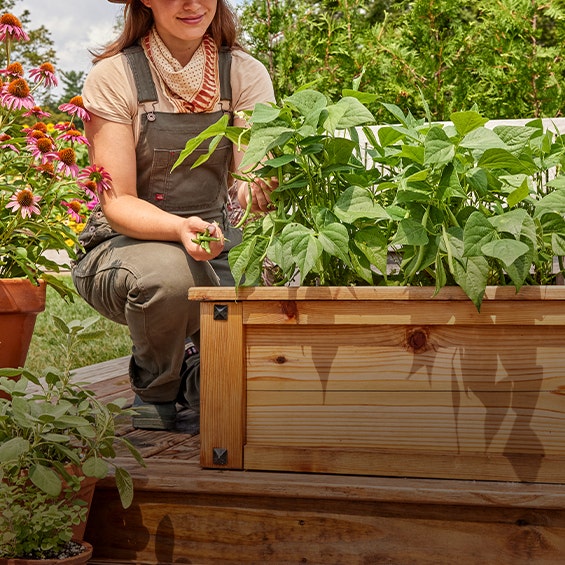
A healthy garden is not only a garden full of vibrant flowers and lush leaves but also one that's full of helpful garden bugs: Bugs that help plants grow and thrive.
We share our home gardens with hundreds of species of insects. While many go unnoticed, some such as honeybees, monarchs and ladybugs grab the spotlight for the work they do and the beauty they provide. But it's important to remember that even the "creepy crawlies" of the garden fill an ecological niche, and our landscapes wouldn't be the same without them. Many insects we refer to as "beneficial" are a smaller piece of a larger puzzle, and creating a garden that draws in and retains as many pieces of the puzzle as possible is important for the overall health of your garden.
Insects benefit the garden in many ways. Some are more obvious and active, like pollination. But other insects affect our gardens in more indirect ways, such as feeding on insects that feed on our plants.
Pollinators
Planting pollinator gardens can attract plant-loving bees but also less obvious pollinators in the yard. For example, the snowberry clearwing moth is unlike any other pollinator in the garden, aside from hummingbirds. These plump pollinators zip through the garden with an audible buzz while they drink nectar from long-flowered favorites like 'Major Wheeler' lonicera (aka honeysuckle) and any number of bee balm. Their nondescript green caterpillars might look like pests, but refrain from squashing them as they'll eventually turn into gorgeous adult moths.
Predators
Pollinators are fantastically helpful garden bugs for flowers and beautiful additions to the garden, but predators keep the nuisance insects' numbers low. Their importance is easily taken for granted but becomes increasingly obvious with their absence!
The aptly named great black wasp is a beast of a wasp and black as the night with iridescent blue wings — they're a sight to see! Although a little shocking to observe as they dart through the garden, these giants pollinate multiple species of Asclepias (aka milkweed) and feed on katydids and grasshoppers. Attract them to your garden by planting Asclepias incarnata (aka swamp milkweed, also a monarch favorite) or 'Sweet Marigold'.
While American hoverflies superficially resemble tiny bees, hoverfly larvae (or maggots) are voracious predators of aphids. When it comes to bugs that help plants, few on this list are as directly helpful. Unlike ladybug larvae, these worm-like critters crawl around on the underside of leaves in stealth mode and don't elicit a response from aphids. In other words, they eat away while aphids graze nearby, unaware of the present danger. Attract adult American hoverflies to your garden by planting alyssum, achillea (aka yarrow) and other small-flowered plants.
Scavengers
While pollinators get all the glory and predators have an edgy appeal, garden scavengers, the after-hours cleanup crew, get very little attention at all. However, these hard workers help improve your garden by cleaning up waste, aerating the soil and improving soil nutrients.
While ants are hardly welcome inside the home and some can cause structural damage, most live their lives searching for dead insects, hunting down pests and aerating the soil with their vast underground nests. Keep ants happy outside by allowing leaves to build up and mulch the soil, and by not spraying insecticides around the home. When peonies bloom in the spring, you might notice ants surrounding the buds, but they're actually providing security for the peonies. In turn, the peony flowers provide sweet nectar from glands on the flower sepals.
Pillbugs, also known as "roly-polies," spend their time scavenging the garden beneath the cover of leaves, stones, wood and just about any other structures in the yard. Interestingly, pillbugs aren't actually insects but rather more closely related to crabs and shrimp. While they'll eat living plants, they usually remain harmless inhabitants of the garden feeding away on decaying plants. Provide habitat for pillbugs by planting low-growing plants such as dianthus (aka pinks) and ajuga (aka bugleweed or carpetweed).
Gardens are full of insects, with the vast majority beneficial or benign. And while some insects do cause damage to plants, there's a whole myriad of species to quickly knock back their populations and keep balance in check. By not spraying insecticides, which can also kill off the slower to reproduce "beneficial" insects, we can easily keep our gardens healthy, strong and full of life.
For more information, go to Burpee's Growing Guides page to learn more about how to care for the plants in your garden, maintenance and much more.



